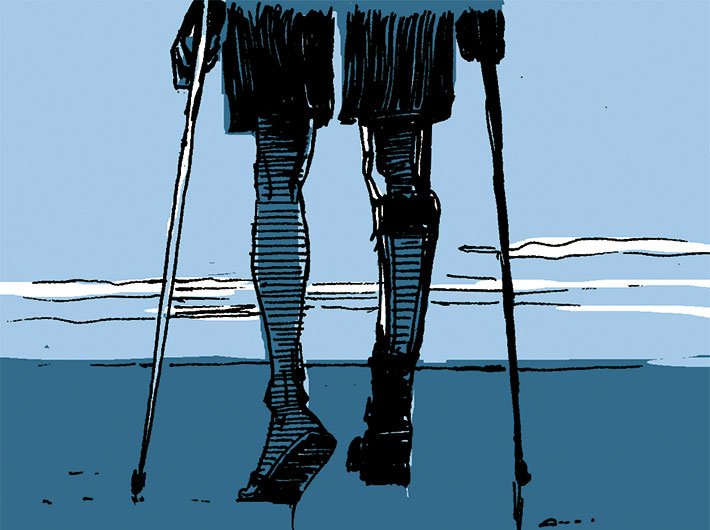Soon the disabled will not have to carry piles of documents and certificates to government offices while applying for various benefits. The ministry of social justice and empowerment plans to issue a universal ID number to persons with disabilities and create a central database. Scheduled for launch in March, the department of empowerment of persons with disabilities (DEPwD), the ministry's nodal agency implementing the project, will issue a web-based unique disability identification (UDID) card that will have an 18-digit number, photo, name, and year of birth, along with QR code.
The Rs 98 crore project will encourage transparency, efficiency and ease of delivering government benefits to the disabled. It will help the government in online tracking of benefits delivered to the disabled at all levels – village, block, district, state and national.
The web-based UDID system, being developed by Ahmedabad-based IT firm Silver Touch Technologies, will help government officials to check the veracity of the beneficiary certificate. The online beneficiary details will include identity details such as name, address, birth date, parents’ or guardian names, mobile number, bank details, income status, type of disability, certificate details, education details, employment details, BPL details, income status and voter ID details. The collected data will be stored in the NIC cloud, MeghRaj.
“Universal ID for persons with disability is just a number. When you type the number in the website you will have a digital copy of the certificate and other details of the person with disability,” says Awanish Kumar Awasthi, joint secretary, DEPwD.
A centralised system will help the government in keeping a log of the disabled. It will include details of the state or district having the largest number of disabled population and kinds of disability prevalent in respective geographies. “Such data will be essential for the central government to formulate policies and schemes to cater to the disabled more effectively,” says K Vikram Simha Rao, director, DEPwD.
Once the database from the entire country is updated, the website will be open for the public, says Rao of DEPwD. Through the unique number, disabled persons will be able to check the central and state governments' schemes available for them on the website.
Corrective measure
The initiative is a corrective step towards eliminating the hassles disabled persons face in getting a certificate and availing benefits. India has nearly 2.68 crore people with some kind of disability, as per the government’s data 2011. However, roughly only one crore out of them have a disability certificate, which is less than 50 percent, according to the DEPwD. Under the disability law of 1995, the certificate is issued to persons with over 40 percent or more disability in seven categories. These include blindness, low vision, leprosy-cured, hearing impairment, locomotor disability, mental retardation and mental illness. But getting the certificate is a cumbersome task that stretches for months and multiple visits, discouraging citizens with disabilities from applying for it, says Javed Abidi, founder of the Disability Rights Group in India.
Acknowledging the fact, Awasthi of DEPwD says that data of the disabled population provided by the states is not uniform in terms of collecting information. That is why the census created from the inputs of the states does not provide complete details of the disabled population. “There are also issues of fake disabled certificates which are misused,” says Awasthi, adding that the certificate verification process in different states too creates problems for a disabled person to access benefits, as every state has its different requirements.
Pilot rollout
The ministry is rolling out a pilot in March in Ratlam district of Madhya Pradesh. The centre will coordinate with the state to set up camps for the distribution of UDID cards. The district administration and panchayats will be roped in for assisting people with their application and creating awareness for the programme, says Rao. “This is an ongoing process. Nobody will be denied the card once you have the certificate issued,” he adds.
Since the project aims to collect standardised data of the disabled citizens and connect one state to another online, the primary target will be to cover those who do not have a disability certificate. The new applicants will be given a disability certificate along with UDID number within two months, says Rao, keeping in mind the assessment of documents and verification of the applicant’s disabilities by local medical officers.
Those who already have the certificate can apply online by providing some extra details, or can visit a camp, he says, adding that their application won’t take more than a month since it won’t go through the verification process again.
“After testing in Ratlam, we will take another two months to modify the software through provided feedbacks, and then scale it up to 10 states. After that, the remaining states will be covered. So our target is to collect data from all states and districts by 2017, maximum by mid-2018, and upload it on the website. This is our first step to implement the programme,” says Rao. The 10 states are Haryana, Gujarat, Madhya Pradesh, Tamil Nadu, Tripura, Odisha, Kerala, Maharashtra, Telangana and Andhra Pradesh.
“The programme will empower us to disseminate information. For instance, if we want to launch a scholarship, seeing the age patterns from the database, we can easily transfer information on mobile phones of the selected group, as nowadays almost every person has it,” says Awasthi.
To monitor the states’ progress, the software has MIS framework that will allow the centre and states to check the status of applications received and cards issued, says Rao. “Information will be updated on a daily basis. If there is any pendency, the chief medical officer at district level will be informed,” he adds.
Legal status
“It is not mandatory yet but we'll encourage people to apply for it. In future, we will come out with legal authority to it. Till then, we will ensure that it doesn’t become something that prevents people from getting benefits,” says Rao.
At present, the rights of persons with disability bill, 2014, pushes for universal acceptance of the disabled certificate across the country. That means the certificate issued by one state would be legally valid in another state, as confirmed by Rao. It also modifies the definition of disability under law by considering a person disabled who has 40 percent or more disability of: autism, low vision and blindness, cerebral palsy, deaf blindness, haemophilia, hearing impairment, leprosy, intellectual disability, mental illness, muscular dystrophy, multiple sclerosis, learning disability, speech and language disability, sickle cell disease, thalassemia, chronic neurological conditions, and multiple disabilities. The bill, yet to be passed by the Rajya Sabha, is meant to replace the 1995 Act.
Future plans
Once the government prepares a database, the next step would be to bring agencies and NGOs affiliated with state governments providing equipment and medical support to the disabled citizens on-board. “All the benefits offered to a disabled person through the government’s schemes will be monitored and updated to their database that will be in control of the central government. So online monitoring will be done on these agencies as well as on the beneficiaries. This will help us track malpractices and loopholes in the supply chain,” says Rao.

